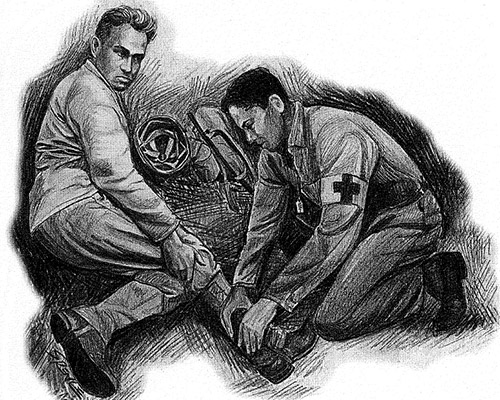By Charles Mills
Hey, look at the preacher!” A sarcastic voice shouted across the wide, wooden, army barracks at Fort Jackson, South Carolina.
Company D’s new recruits turned and stared at a young, slender figure kneeling beside a low bunk by the window. The soldier’s mouth moved silently as he prayed.
“He’s probably asking God to get him out of the Army!” another called. Laughter erupted from the crowd of men in green fatigues.
Suddenly a heavy Army boot sailed over the praying man’s bunk and smashed into a metal cabinet standing against the wall.
More shoes arched through the air, accompanied by a foul stream of mocking remarks. The hands folded in prayer trembled slightly.
The mournful strains of taps quieted the assault as men flopped into bed and the barracks settled into silence. The lonely recruit with the wavy brown hair whispered an emotional amen and slipped under the thin, olive-drab blanket. Private Desmond T. Doss’s first day in the United States Army, 77th Infantry Division, had ended. The year was 1942.
“You’re not comin’ back alive!”
Returning from breakfast the next morning, Doss felt a heavy hand on his shoulder. An angry-voiced soldier spat words into his face. “Listen, holy Jesus, when we go into combat you’re not comin’ back alive. You wanna know why?”
The young recruit stared back unflinchingly into the squinting eyes. ” ‘Cause if the Japs don’t kill you, I will!” The man turned and stormed away.
Desmond Doss was a Seventh-day Adventist-had been all his young life. He’d grown up on Bible stories of men and women who’d stood up for their religious beliefs, even in the face of danger and death. But never during those 4 moments in Sabbath school and church had he thought he’d be called upon to demonstrate his faith so boldly.
Japan’s attack on Hawaii’s Pearl Harbor in December 1941 had thrown the United · States into World War II. Draft notices informed a whole generation of young men of Uncle Sam’s decision to make them part of their nation’s fighting force. Doss reported immediately. Didn’t the Bible teach that we should obey the laws of the land?
But there was a problem. Like Doss, many Christians refused to carry or fire a weapon of any kind. The same Bible that urged all to obey their government also commanded, in no uncertain terms, “Thou shalt not kill.”
“I’ll be happy to serve my country,” Desmond told the military officer signing him in, “but I will not carry a gun. Let me put my energies into working as a medic, trained to treat wounded men on the battlefield.” So where did he end up? In a rifle company. Doss protested, and was eventually assigned to the medics, where he began training as a medical soldier.
He quickly learned how to use whatever material was at hand-saplings, rifle stocks to form splints for broken arms and legs. He was taught how to administer blood plasma in the thick of battle, what to do for shock, when to provide water to the injured, and, just as important, when not to .
But hard work and dedication weren’t enough to appease his tormentors.
“You guys are all alike,” a sarcastic sergeant jeered one day. “You talk big about religious freedom, but when your country needs you to help protect that freedom, you chicken out.” “That’s where you’re wrong, Sergeant,” Desmond responded respectfully. “I love this country just as much as you do. You won’t find me failing to salute the flag or trying to get out of a work detail. I just refuse to kill, that’s all.”
There was another reason for Doss’s unpopularity. He doggedly insisted on keeping the fourth commandment.
“Now what?” his superior groaned as the youthful noncombatant approached with a smart salute.
“Sir, I’d like to attend church services this Saturday as my beliefs dictate.” “Saturday!” The man chuckled. “You’re a little confused, Private. The Army already allows its fighting force time off on Sunday.”
“I understand, sir,” the slender recruit pressed. “But I believe in the Bible Sabbath. That’s the seventh day of the week, Saturday. God asks us to keep it holy by worshipping Him and refraining from all work. I’ll be happy to do double duty on Sunday.”
Reluctantly the man issued the Saturday pass to Desmond.
In the battle of wills between the United States Army and Private Desmond T. Doss on the issue of Sabbath observance, someone would have to back down; And it wouldn’t be Desmond.
The test
Reveille pierced the hot morning air. “Rise and shine, you mama’s boys,” the sergeant roared as he paced down the length of the barracks. “Today we find out what you’re really made of. And you’d better be ready. We’ve got 25 miles of full field-pack marching waiting for your enjoyment.” The man paused at the door. “Oh yes, and you’ll do it in eight hours.”
“Hey, preacher!” a familiar voice called as the men assembled on the training ground. “No pass today?”
“He’s got it made,” another growled. “No rifle, no ammo. maybe he’ll stop and pick some flowers along the way.”
Doss grinned, but didn’t bother to respond. His two canvas first-aid kits matched a rifle’s weight and were twice as awkward. His Christian beliefs were cutting him no slack this day.
The march began. Soon sweat caused field uniforms to stick to their wearers like moist glue. As midday approached, the company staggered like zombies, eyes red, faces pale.
Suddenly a man fell. Desmond rushed to his side. His instructor’s words echoed in his ears. “Clammy skin. Pulse barely readable. That’s heat prostration.” Doss made the victim as comfortable as possible and turned him over to the ambulance that followed some distance behind.
Then he had to run to catch up with his company. High noon brought a lunch break. K-rations quickly disappeared down hungry throats. As Desmond took his first bite, another soldier slumped under a small tree and called for help. The man was examining a large blister on his heel.
“Do something,” he pleaded.
“I’ll try,” Desmond reassured his comrade. He quickly pricked the blister with a sterile needle, doused the injured area with Merthiolate, then dressed it tightly with gauze. As he was finishing, another voice called out for help. Then another. He continued attending hurting, aching men until the sergeant shouted, “Fall in. Now we go back!”
Injuries kept Desmond hopping for the entire return trip. He’d.fix up a man as best he could, then rush to another. Despite his running around, he finished the march with the platoon. Even while lined up waiting for dismissal, three men passed out cold. Desmond hurried to their aid.
Soon all the soldiers were in their bunks with their shoes off. Doss still didn’t rest. He checked every foot. That morning some had jeered him, calling him names. Now, lying exhausted, they watched the soft-spoken medic kneel by their bunks and treat their feet. “Hey, preacher,” one said, respect in his voice, “you’re OK.” The jeering stopped, replaced by hesitant words of thanks and friendship.
For Desmond Doss and the other members of Company D, the future would hold another test. On a distant Pacific island unimagined horrors waited. On its rugged terrain Desmond would be forced to search deep within himself and decide just how far he was willing to carry his belief and trust in the God he loved.


